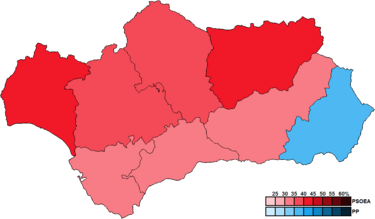| |||||||||||||||||||||||||||||||||||||||||||||||||||||||||||||||||||||||||||||||||||||||||
All 109 seats in the Parliament of Andalusia 55 seats needed for a majority | |||||||||||||||||||||||||||||||||||||||||||||||||||||||||||||||||||||||||||||||||||||||||
|---|---|---|---|---|---|---|---|---|---|---|---|---|---|---|---|---|---|---|---|---|---|---|---|---|---|---|---|---|---|---|---|---|---|---|---|---|---|---|---|---|---|---|---|---|---|---|---|---|---|---|---|---|---|---|---|---|---|---|---|---|---|---|---|---|---|---|---|---|---|---|---|---|---|---|---|---|---|---|---|---|---|---|---|---|---|---|---|---|---|
| Opinion polls | |||||||||||||||||||||||||||||||||||||||||||||||||||||||||||||||||||||||||||||||||||||||||
| Registered | 6,462,627 | ||||||||||||||||||||||||||||||||||||||||||||||||||||||||||||||||||||||||||||||||||||||||
| Turnout | 4,026,282 (62.3%) | ||||||||||||||||||||||||||||||||||||||||||||||||||||||||||||||||||||||||||||||||||||||||
| |||||||||||||||||||||||||||||||||||||||||||||||||||||||||||||||||||||||||||||||||||||||||
 Constituency results map for the Parliament of Andalusia | |||||||||||||||||||||||||||||||||||||||||||||||||||||||||||||||||||||||||||||||||||||||||
| |||||||||||||||||||||||||||||||||||||||||||||||||||||||||||||||||||||||||||||||||||||||||
The 2015 Andalusian regional election was held on Sunday, 22 March 2015, to elect the 10th Parliament of the autonomous community of Andalusia. All 109 seats in the Parliament were up for election.
President Susana Díaz chose to terminate the coalition government between her Spanish Socialist Workers' Party (PSOE–A) and United Left (IULV–CA), dissolving the Parliament and calling a snap election for 22 March 2015.[1] Andalusia had been traditionally considered a PSOE stronghold, being the only region in Spain in which no other party had led the regional government since the Spanish transition to democracy.
The PSOE–A regained first place from a declining People's Party (PP). Suffering from voters' anger at Mariano Rajoy's national government management of the economic crisis and the corruption scandals affecting the party nationwide, the PP scored its worst result since 1990. The election also saw a strong performance by newcomers Podemos (Spanish for "We can") and Citizens (C's), which faced their first electoral test since the 2014 European Parliament election.[2][3] IULV–CA was decimated by Podemos's surge and obtained its worst historical showing.
After the election, the PP announced it would block any PSOE attempt to form a government,[4] a shock to many after the party had assured during the electoral campaign that it would allow the most-voted party to access government.[5] Podemos and C's remained reluctant to lend support to Susana Díaz's investiture,[6][7] whereas IU was not willing to align with the Socialists again after their previous alliance broke up.[8] In the end, however, after the 2015 Spanish regional and municipal elections were held, C's agreed to support Díaz investiture on less harsher conditions than initially required, in order to end the parliamentary deadlock and prevent a new election.[9]
- ^ "Susana Díaz rompe con IU y adelanta las elecciones andaluzas a marzo". El País (in Spanish). 25 January 2015. Archived from the original on 6 December 2019. Retrieved 3 February 2020.
- ^ "Andalucía, el primer test electoral de la nueva era de la política española". La Nación (in Spanish). 22 March 2015. Archived from the original on 7 September 2020. Retrieved 3 February 2020.
- ^ "Podemos se consolida en el primer test electoral de 2015". eldiario.es (in Spanish). 23 March 2015. Archived from the original on 3 February 2020. Retrieved 3 February 2020.
- ^ "El PP votará en contra de Díaz para que el PSOE se 'retrate' con Podemos o Ciudadanos". El Confidencial (in Spanish). 24 March 2015. Archived from the original on 7 September 2020. Retrieved 3 February 2020.
- ^ "El PP anuncia ahora que votará en contra de la investidura de Díaz". El País (in Spanish). 24 March 2015. Archived from the original on 30 March 2015. Retrieved 3 February 2020.
- ^ "Ciudadanos votará en contra de la investidura de Susana Díaz". ABC (in Spanish). 23 March 2015. Archived from the original on 29 November 2018. Retrieved 3 February 2020.
- ^ "Podemos hace esperar a Díaz". El Mundo (in Spanish). Archived from the original on 7 September 2020. Retrieved 3 February 2020.
- ^ "El no del PP-A a la investidura obliga al resto de partidos a tomar postura". eldiario.es. 25 March 2015. Archived from the original on 1 May 2019. Retrieved 3 February 2020.
- ^ "Susana Díaz será investida el jueves tras el acuerdo con Ciudadanos". El Mundo (in Spanish). 9 June 2015. Archived from the original on 24 February 2020. Retrieved 3 February 2020.




